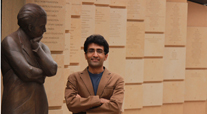This interview with La Jolla postdoctoral associate Samad Jahandideh, PhD, is the third installment in our “Meet our Postdocs” Beaker series. Samad works in the laboratory of Adam Godzik, PhD, which focuses on biological systems and their evolution.
Samad, tell us about your background. Where are you from and what did you do before you joined Sanford-Burnham?
I was born in a small city, Darab, in southern Iran; a city whose civilization goes back thousands of years. My academic background consists of an undergraduate degree in Cell and Molecular Biology, followed by an MS and PhD in Biophysics, all from universities in Iran. After completing my PhD, I decided to apply for a postdoc position in the United States to take a step closer toward what my heart wanted. My first position in the U.S., before joining Sanford-Burnham, was an 18-month postdoc job in the Department of Biostatistics at the University of Alabama at Birmingham.
Why did you decide to become a postdoc at Sanford-Burnham? And why did you pick the lab you’re currently in?
After my first postdoc position, I decided to do my second postdoc training as part of a leading group that would provide me the opportunity to follow and improve my previous line of research. I went through many interviews and finally decided to move to the Godzik lab at Sanford-Burnham, which is pioneering the prediction of crystallizability of protein sequences. Another consideration was – I love southern California, with all the sunshine and blue sky almost all year long.
Tell us about your research. What do you currently work on?
My current work is focused on developing machine-learning-based methods to show the power of these techniques in overcoming complex biological problems. For example, during the last year I updated the XtalPred server, a widely used algorithm for sequence-based prediction of crystalliability of protein sequences, by using machine-learning methods. This led to an almost twofold improvement in the prediction of crystallization success over the original algorithm. It is expected to lower the cost of protein-structure determination, facilitate the testing of drugs, and advance basic observations into clinical applications. Recently, these results were highlighted by PSI/Nature Structural Biology Knowledgebase.
Which part of your work do you like best, which part do you like least?
I don’t like fixed working hours. As a postdoc at Sanford-Burnham I like having flexible working hours. On the other hand, I like my bioinformatics projects at the Institute because the software that is developed as part of these projects will facilitate biomedical science.
Twenty years from now, where do you see yourself?
My long-term career goal is to become a successful academician and to develop a strong research program and curriculum in computational biology dedicated to the development of novel machine-learning algorithms to solve complex biological problems. It is difficult to predict the future but for sure I will stay in academia.
Tell us something about the Samad outside of Sanford-Burnham? What are your hobbies?
Outside of Sanford-Burnham, I am passionate about visual arts, e.g. designing and making musical instruments, sculptures, and even origami. A long time ago I started to learn how to make violins in my father’s workshop. I remember that a violin I made for a musician had a warm sound and the owner was very happy and commented on it when I met him a few years later.
What’s your favorite music and book?
The Tale of Sinuhe is my favorite book. Although there is an ongoing debate among Egyptologists whether it is an actual story or a work of fiction, it includes interesting and diverse aspects of ancient Egyptian society from science to culture. My favorite music is classical music, especially solo and concerto for the violin and guitar. I love expressive classical pieces by Niccolò Paganini for solo violin.
What is the best piece of advice anyone has ever given you?
The best advice I ever got was to keep trying after you fail. I think grit contributes much more to success than IQ.
